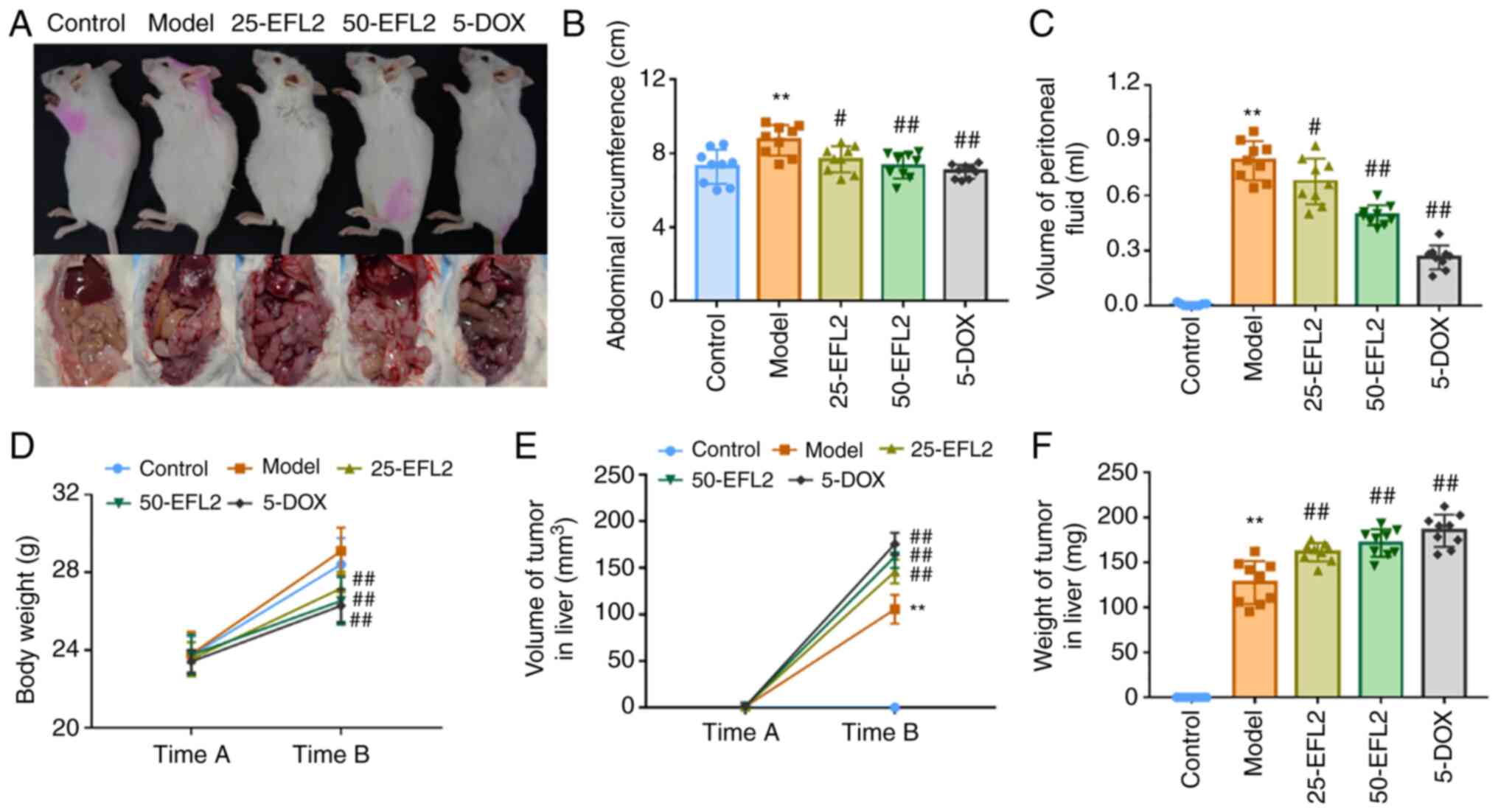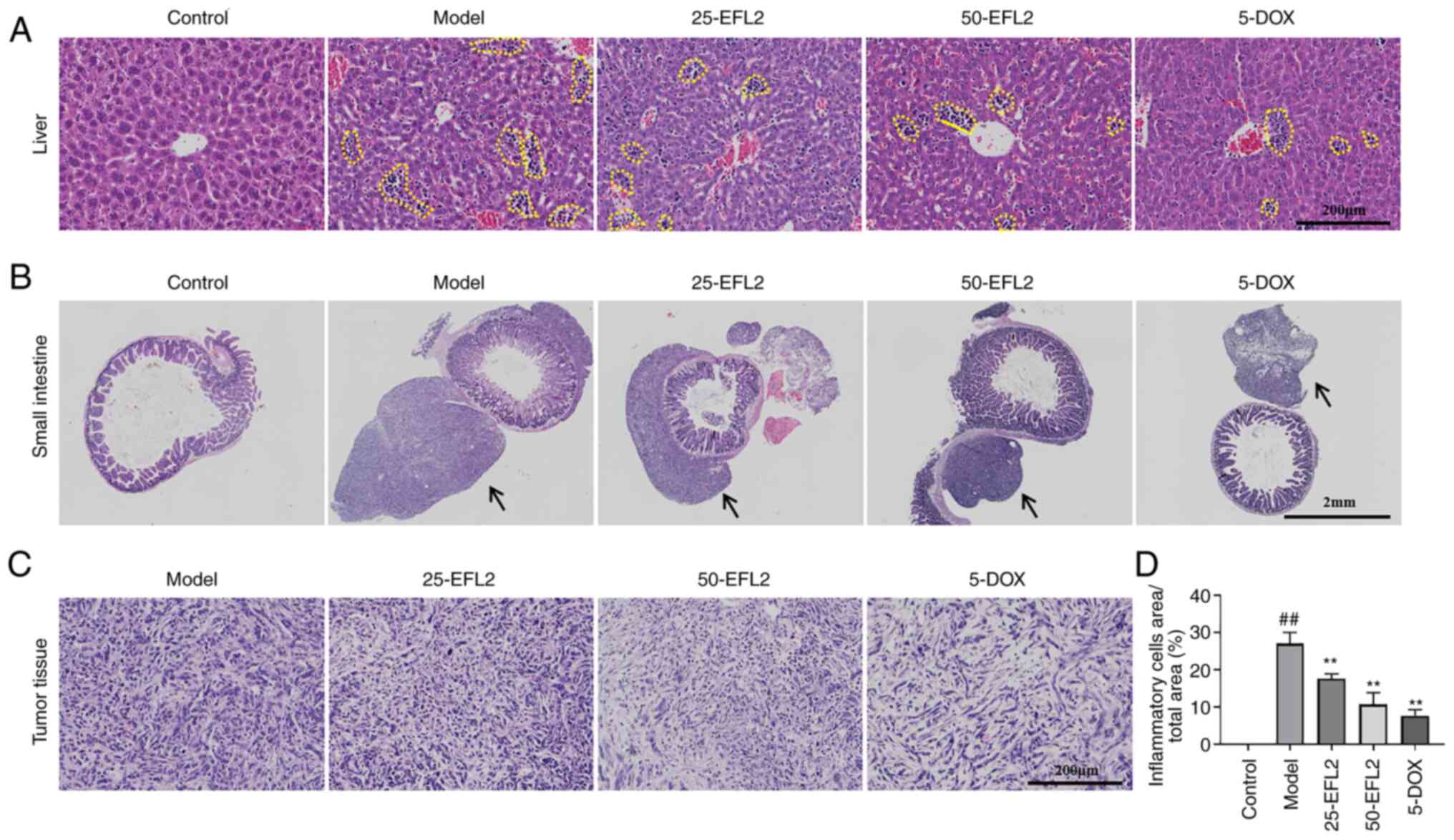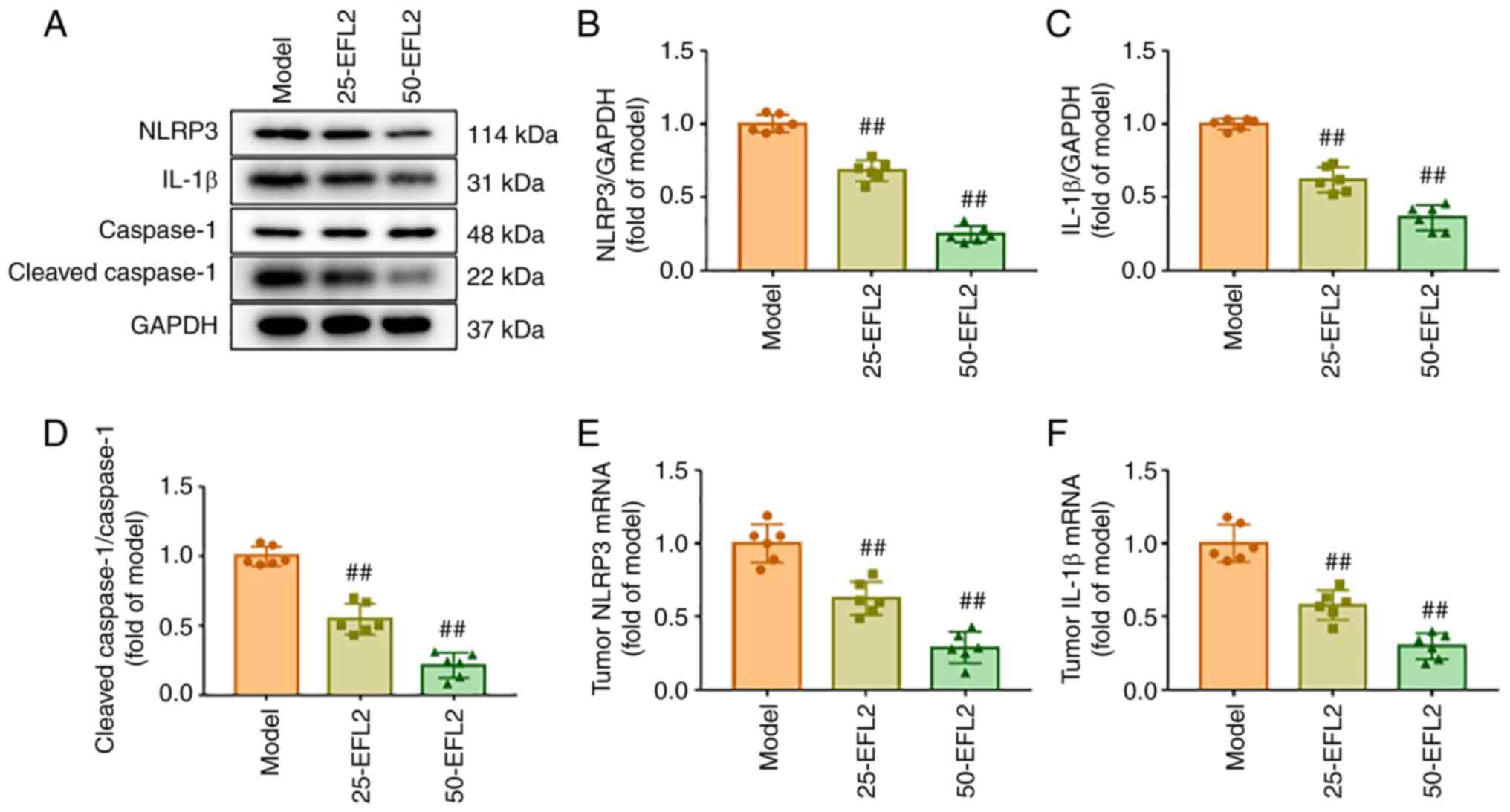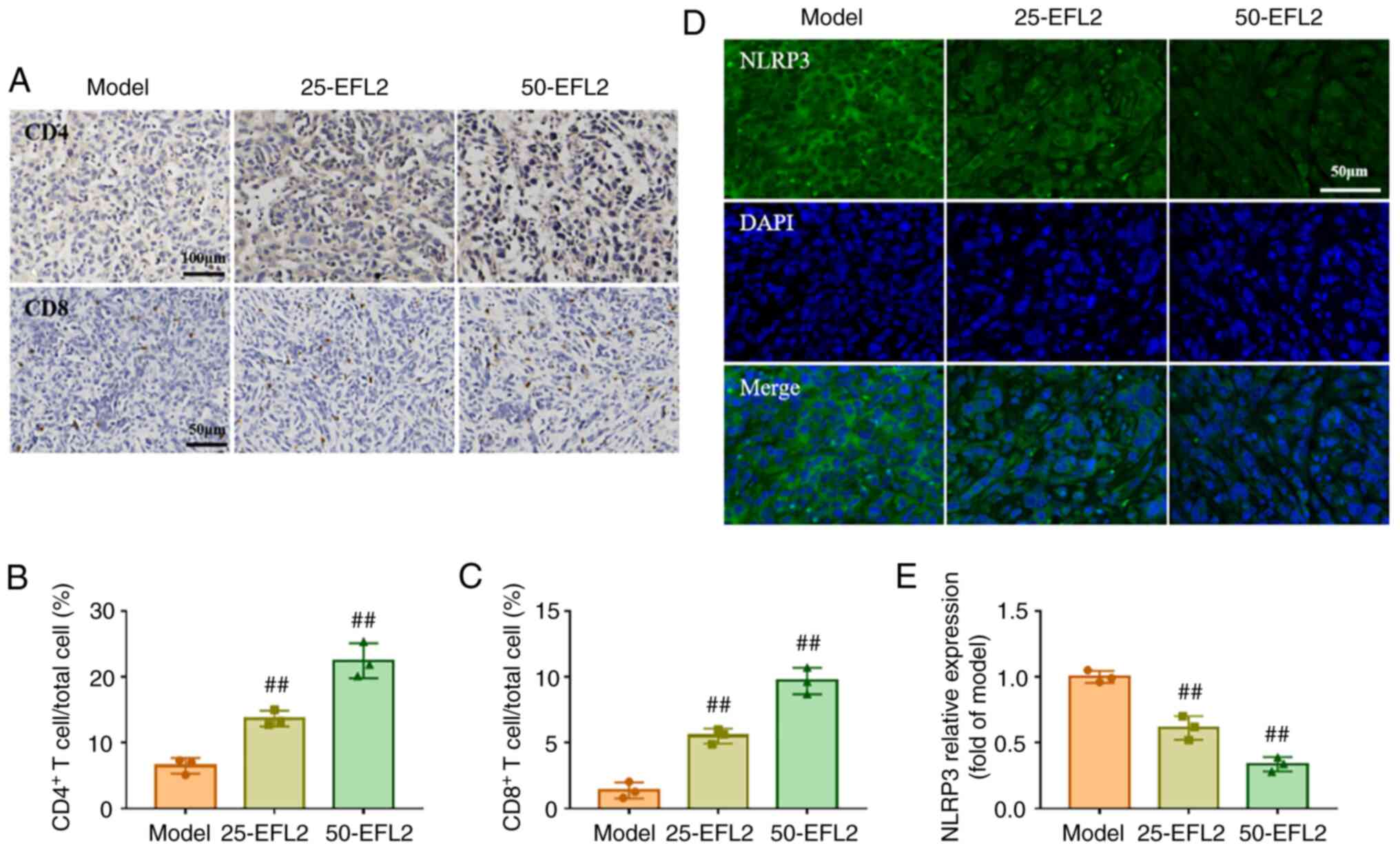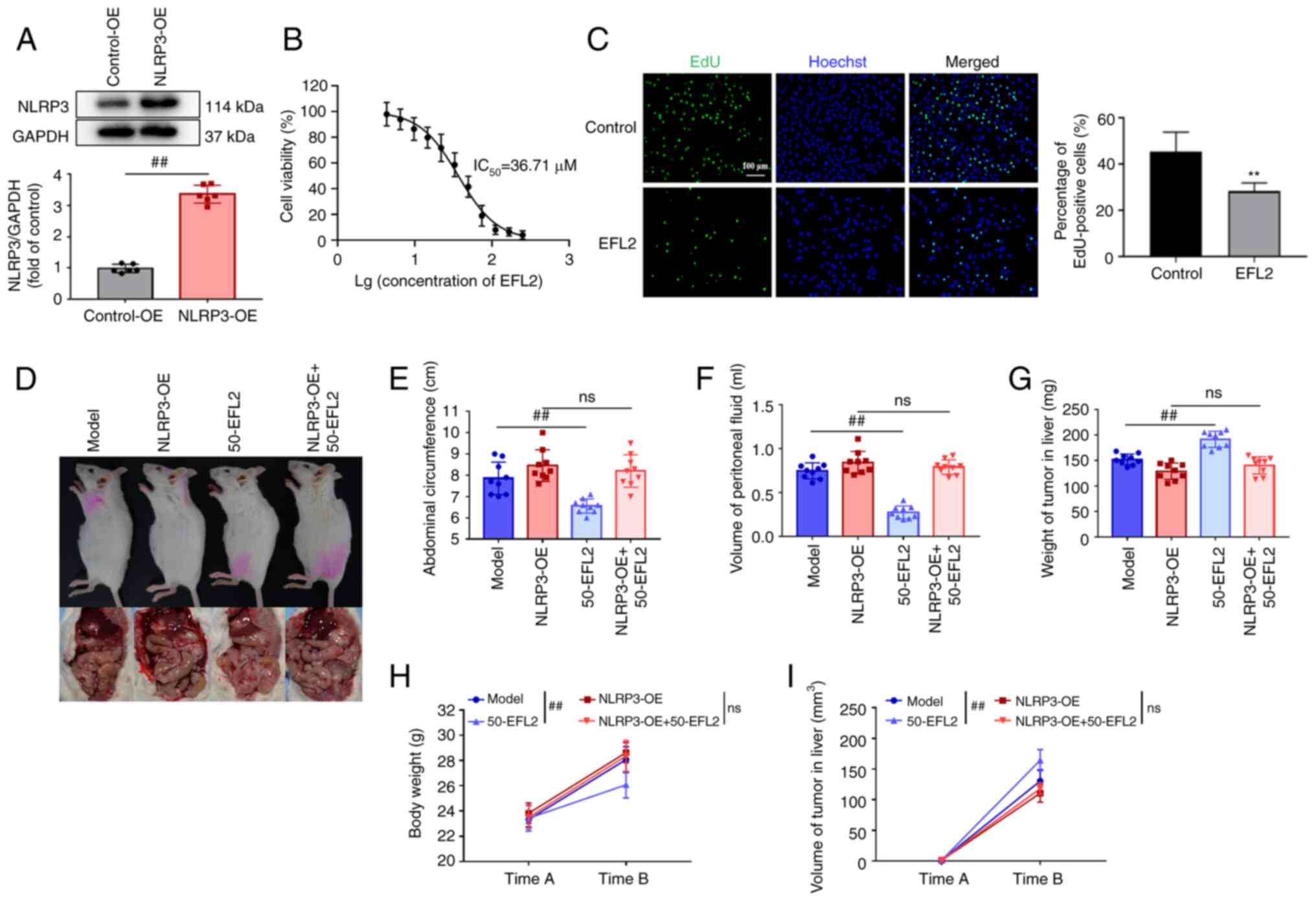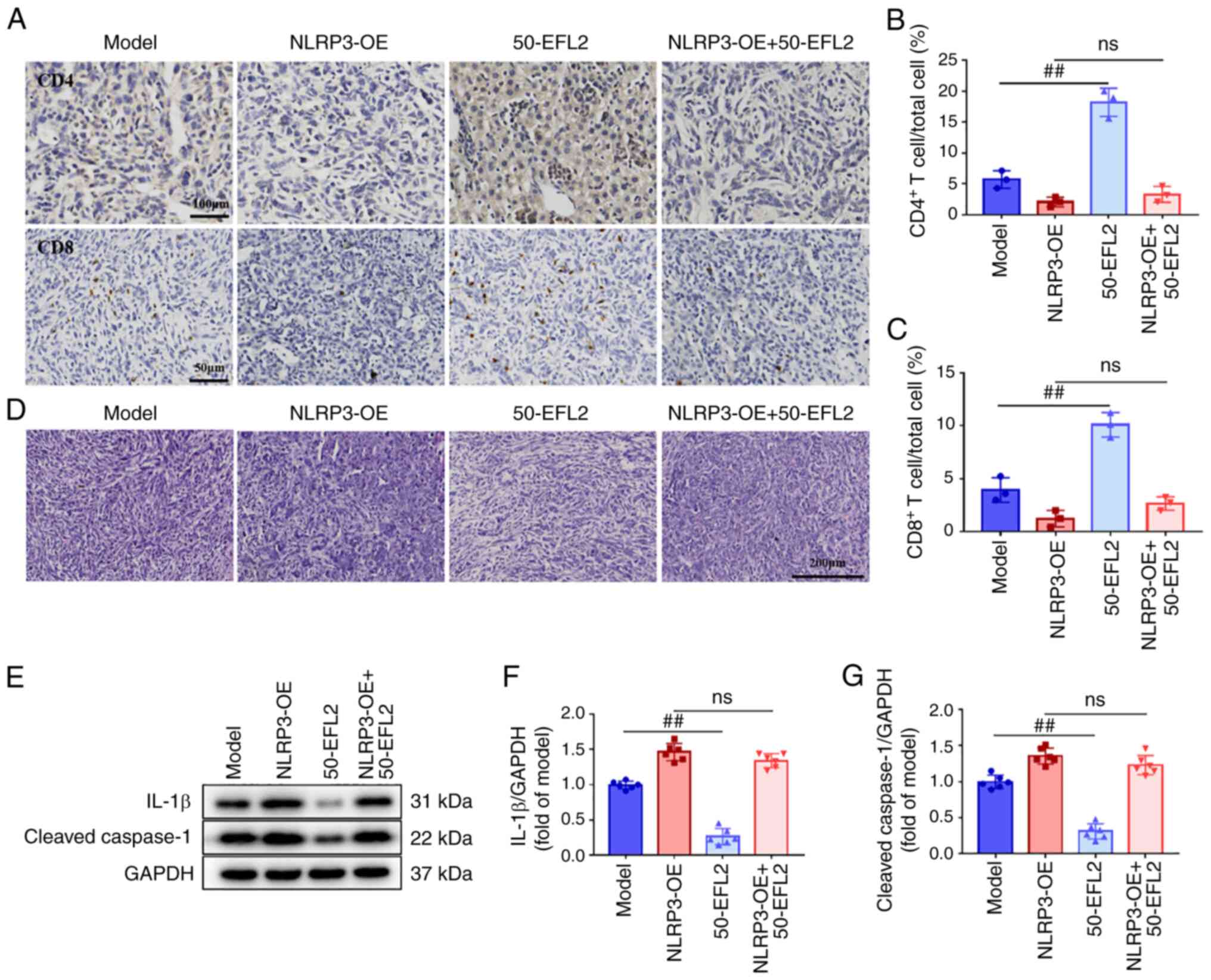|
1
|
Bray F, Ferlay J, Soerjomataram I, Siegel
RL, Torre LA and Jemal A: Global cancer statistics 2018: GLOBOCAN
estimates of incidence and mortality worldwide for 36 cancers in
185 countries. CA Cancer J Clin. 68:394–424. 2018.
|
|
2
|
DeSantis CE, Ma J, Goding Sauer A, Newman
LA and Jemal A: Breast cancer statistics, 2017, racial disparity in
mortality by state. CA Cancer J Clin. 67:439–448. 2017.
|
|
3
|
Tao L, Chu L, Wang LI, Moy L, Brammer M,
Song C, Green M, Kurian AW, Gomez SL and Clarke CA: Occurrence and
outcome of de novo metastatic breast cancer by subtype in a large,
diverse population. Cancer Causes Control. 27:1127–1138. 2016.
|
|
4
|
Hazem RM, Mohamed AA, Ghareb N, Mehanna
ET, Mesbah NM, Abo-Elmatty DM and Elgawish MS: Anti-cancer activity
of two novel heterocyclic compounds through modulation of VEGFR and
miR-122 in mice bearing Ehrlich ascites carcinoma. Eur J Pharmacol.
892:1737472021.
|
|
5
|
Guo W, Zhang S and Liu S: Establishment of
a novel orthotopic model of breast cancer metastasis to the lung.
Oncol Rep. 33:2992–2998. 2015.
|
|
6
|
Kipps E, Tan DS and Kaye SB: Meeting the
challenge of ascites in ovarian cancer: New avenues for therapy and
research. Nat Rev Cancer. 13:273–282. 2013.
|
|
7
|
Sangisetty SL and Miner TJ: Malignant
ascites: A review of prognostic factors, pathophysiology and
therapeutic measures. World J Gastrointest Surg. 4:87–95. 2012.
|
|
8
|
Mikuła-Pietrasik J, Uruski P, Szubert S,
Moszyński R, Szpurek D, Sajdak S, Tykarski A and Książek K:
Biochemical composition of malignant ascites determines high
aggressiveness of undifferentiated ovarian tumors. Med Oncol.
33:942016.
|
|
9
|
Yin T, Wang G, He S, Shen G, Su C, Zhang
Y, Wei X, Ye T, Li L, Yang S, et al: Malignant pleural effusion and
ascites induce epithelial-mesenchymal transition and cancer
stem-like cell properties via the vascular endothelial growth
factor (VEGF)/Phosphatidylinositol 3-Kinase (PI3K)/Akt/Mechanistic
target of rapamycin (mTOR) pathway. J Biol Chem. 291:26750–26761.
2016.
|
|
10
|
Vargas-Villarreal J, Cruz-Ramos M,
Espino-Ojeda A, Gutierrez-Hermosillo H, Díaz De Leon-Gonzalez E,
Monsivais-Diaz O, Palacios-Corona R, Martinez-Armenta CA,
González-Salazar F, Moreno-Treviño MG and Guzman-De La Garza FJ:
Acellular fraction from malignant effusions has cytotoxicity in
breast cancer cells. Mol Clin Oncol. 14:1062021.
|
|
11
|
Gupta V, Yull F and Khabele D: Bipolar
tumor-associated macrophages in ovarian cancer as targets for
therapy. Cancers (Basel). 10:3662018.
|
|
12
|
Song XD, Wang YN, Zhang AL and Liu B:
Advances in research on the interaction between inflammation and
cancer. J Int Med Res. 48:3000605198953472020.
|
|
13
|
Shen Y, Guo D, Weng L, Wang S, Ma Z, Yang
Y, Wang P, Wang J and Cai Z: Tumor-derived exosomes educate
dendritic cells to promote tumor metastasis via
HSP72/HSP105-TLR2/TLR4 pathway. Oncoimmunology. 6:e13625272017.
|
|
14
|
Holl EK, Frazier V, Landa K, Boczkowski D,
Sullenger B and Nair SK: Controlling cancer-induced inflammation
with a nucleic acid scavenger prevents lung metastasis in murine
models of breast cancer. Mol Ther. 29:1772–1781. 2021.
|
|
15
|
Wellenstein MD, Coffelt SB, Duits DEM, van
Miltenburg MH, Slagter M, de Rink I, Henneman L, Kas SM, Prekovic
S, Hau CS, et al: Loss of p53 triggers WNT-dependent systemic
inflammation to drive breast cancer metastasis. Nature.
572:538–542. 2019.
|
|
16
|
Tengesdal IW, Menon DR, Osborne DG, Neff
CP, Powers NE, Gamboni F, Mauro AG, D'Alessandro A, Stefanoni D,
Henen MA, et al: Targeting tumor-derived NLRP3 reduces melanoma
progression by limiting MDSCs expansion. Proc Natl Acad Sci USA.
118:e20009151182021.
|
|
17
|
Sun R, Gu J, Chang X, Liu F, Liang Y, Yang
X, Liang L and Tang D: Metabonomics study on orthotopic
transplantion mice model of colon cancer treated with astragalus
membranaceus-curcuma wenyujin in different proportions via
UPLC-Q-TOF/MS. J Pharm Biomed Anal. 193:1137082021.
|
|
18
|
Ratajczak MZ, Bujko K, Cymer M, Thapa A,
Adamiak M, Ratajczak J, Abdel-Latif AK and Kucia M: The Nlrp3
inflammasome as a 'rising star' in studies of normal and malignant
hematopoiesis. Leukemia. 34:1512–1523. 2020.
|
|
19
|
Zaki MH, Vogel P, Body-Malapel M, Lamkanfi
M and Kanneganti TD: IL-18 production downstream of the Nlrp3
inflammasome confers protection against colorectal tumor formation.
J Immunology. 185:4912–4920. 2010.
|
|
20
|
Li S, Liang X, Ma L, Shen L, Li T, Zheng
L, Sun A, Shang W, Chen C, Zhao W and Jia J: MiR-22 sustains NLRP3
expression and attenuates H. pylori-induced gastric carcinogenesis.
Oncogene. 37:884–896. 2018.
|
|
21
|
Guo B, Fu S, Zhang J, Liu B and Li Z:
Targeting inflammasome/IL-1 pathways for cancer immunotherapy. Sci
Rep. 6:361072016.
|
|
22
|
Ershaid N, Sharon Y, Doron H, Raz Y, Shani
O, Cohen N, Monteran L, Leider-Trejo L, Ben-Shmuel A, Yassin M, et
al: NLRP3 inflammasome in fibroblasts links tissue damage with
inflammation in breast cancer progression and metastasis. Nat
Commun. 10:43752019.
|
|
23
|
Tang J, Cheng X, Yi S, Zhang Y, Tang Z,
Zhong Y, Zhang Q, Pan B and Luo Y: Euphorbia factor L2
ameliorates the progression of K/BxN serum-induced arthritis by
blocking TLR7 mediated IRAK4/IKKβ/IRF5 and NF-kB signaling
pathways. Front Pharmacol. 12:7735922021.
|
|
24
|
Lin M, Tang S, Zhang C, Chen H, Huang W,
Liu Y and Zhang J: Euphorbia factor L2 induces apoptosis in A549
cells through the mitochondrial pathway. Acta Pharm Sin B. 7:59–64.
2017.
|
|
25
|
Fan L, Zhu H, Tao W, Liu L, Shan X, Zhao M
and Sun D: Euphorbia factor L2 inhibits TGF-β-induced cell growth
and migration of hepatocellular carcinoma through AKT/STAT3.
Phytomedicine. 62:1529312019.
|
|
26
|
Zhang Q, Zhu S, Cheng X, Lu C, Tao W,
Zhang Y, William BC, Cao X, Yi S, Liu Y, et al: Euphorbia factor L2
alleviates lipopolysaccharide-induced acute lung injury and
inflammation in mice through the suppression of NF-κB activation.
Biochem Pharmacol. 155:444–454. 2018.
|
|
27
|
Tallón de Lara P, Castañón H, Vermeer M,
Núñez N, Silina K, Sobottka B, Urdinez J, Cecconi V, Yagita H,
Movahedian Attar F, et al: CD39+PD-1+CD8+ T cells mediate
metastatic dormancy in breast cancer. Nat Commun. 12:7692021.
|
|
28
|
Lim HI, Yamamoto J, Han Q, Sun YU, Nishino
H, Tashiro Y, Sugisawa N, Tan Y, Choi HJ, Nam SJ, et al: Response
of triple-negative breast cancer liver metastasis to oral
recombinant methioninase in a patient-derived orthotopic xenograft
(PDOX) model. In Vivo. 34:3163–3169. 2020.
|
|
29
|
Zhang S, Liu X, Abdulmomen Ali Mohammed S,
Li H, Cai W, Guan W, Liu D, Wei Y, Rong D, Fang Y, et al: Adaptor
SH3BGRL drives autophagy-mediated chemoresistance through promoting
PIK3C3 translation and ATG12 stability in breast cancers.
Autophagy. 18:1822–1840. 2022.
|
|
30
|
Livak KJ and Schmittgen TD: Analysis of
relative gene expression data using real-time quantitative PCR and
the 2(-Delta Delta C(T)) method. Methods. 25:402–408. 2001.
|
|
31
|
Nirgude S, Mahadeva R, Koroth J, Kumar S,
Kumar KSS, Gopalakrishnan V, S Karki SS and Choudhary B: ST09, a
novel curcumin derivative, blocks cell migration by inhibiting
matrix metalloproteases in breast cancer cells and inhibits tumor
progression in EAC mouse tumor models. Molecules. 25:44992020.
|
|
32
|
Papageorgis P, Ozturk S, Lambert AW,
Neophytou CM, Tzatsos A, Wong CK, Thiagalingam S and Constantinou
AI: Targeting IL13Ralpha2 activates STAT6-TP63 pathway to suppress
breast cancer lung metastasis. Breast Cancer Res. 17:982015.
|
|
33
|
De Simone V, Franzè E, Ronchetti G,
Colantoni A, Fantini MC, Di Fusco D, Sica GS, Sileri P, MacDonald
TT, Pallone F, et al: Th17-type cytokines, IL-6 and TNF-α
synergistically activate STAT3 and NF-kB to promote colorectal
cancer cell growth. Oncogene. 34:3493–3503. 2015.
|
|
34
|
Mishra DK, Rocha HJ, Miller R and Kim MP:
Immune cells inhibit the tumor metastasis in the 4D cellular lung
model by reducing the number of live circulating tumor cells. Sci
Rep. 8:165692018.
|
|
35
|
Yang C, Wang Z, Li L, Zhang Z, Jin X, Wu
P, Sun S, Pan J, Su K, Jia F, et al: Aged neutrophils form
mitochondria-dependent vital NETs to promote breast cancer lung
metastasis. J Immunother Cancer. 9:e0028752021.
|
|
36
|
Hsieh CC, Wang CH and Huang YS: Lunasin
attenuates obesity-associated metastasis of 4T1 breast cancer cell
through anti-inflammatory property. Int J Mol Sci. 17:21092016.
|
|
37
|
Monkkonen T and Debnath J: Inflammatory
signaling cascades and autophagy in cancer. Autophagy. 14:190–198.
2018.
|
|
38
|
Zhao S, Shen W, Du R, Luo X, Yu J, Zhou W,
Dong X, Gao R, Wang C, Yang H and Wang S: Three
inflammation-related genes could predict risk in prognosis and
metastasis of patients with breast cancer. Cancer Med. 8:593–605.
2019.
|
|
39
|
Lu Z, Long Y, Li J, Li J, Ren K, Zhao W,
Wang X, Xia C, Wang Y, Li M, et al: Simultaneous inhibition of
breast cancer and its liver and lung metastasis by blocking
inflammatory feed-forward loops. J Control Release. 338:662–679.
2021.
|
|
40
|
Johnson DE, O'Keefe RA and Grandis JR:
Targeting the IL-6/JAK/STAT3 signalling axis in cancer. Nat Rev
Clin Oncol. 15:234–248. 2018.
|
|
41
|
Liang M, Chen X, Wang L, Qin L, Wang H,
Sun Z, Zhao W and Geng B: Cancer-derived exosomal TRIM59 regulates
macrophage NLRP3 inflammasome activation to promote lung cancer
progression. J Exp Clin Cancer Res. 39:1762020.
|
|
42
|
Wang H, Luo Q, Feng X, Zhang R, Li J and
Chen F: NLRP3 promotes tumor growth and metastasis in human oral
squamous cell carcinoma. BMC Cancer. 18:5002018.
|
|
43
|
Shao X, Lei Z and Zhou C: NLRP3 promotes
colorectal cancer cell proliferation and metastasis via regulating
epithelial mesenchymal transformation. Anticancer Agents Med Chem.
20:820–827. 2020.
|
|
44
|
Deng Q, Geng Y, Zhao L, Li R, Zhang Z, Li
K, Liang R, Shao X, Huang M, Zuo D, et al: NLRP3 inflammasomes in
macrophages drive colorectal cancer metastasis to the liver. Cancer
Lett. 442:21–30. 2019.
|
|
45
|
Lee HE and Lee JY, Yang G, Kang HC, Cho
YY, Lee HS and Lee JY: Inhibition of NLRP3 inflammasome in tumor
microenvironment leads to suppression of metastatic potential of
cancer cells. Sci Rep. 9:122772019.
|















